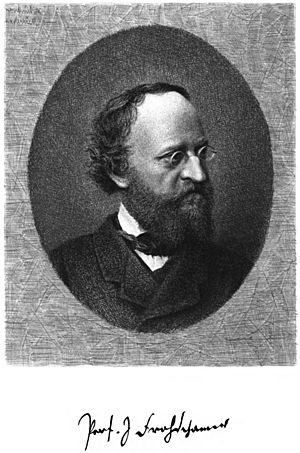Jakob Frohschammer facts for kids
Jakob Frohschammer (born January 6, 1821 – died June 14, 1893) was a German thinker. He was a theologian, which means he studied religion, and a philosopher, meaning he explored big ideas about life and knowledge. He is known for his independent thinking.
Contents
Early Life and Studies
Jakob Frohschammer was born in 1821 in a place called Illkofen, near Regensburg, Germany. His parents wanted him to become a Roman Catholic priest. So, he went to Munich to study theology. However, he found himself more interested in philosophy.
Despite his doubts, he became a priest in 1847. But Jakob was a very logical person. He didn't like it when authority went against his own beliefs. This made it hard for him to follow the Church's strict rules. He even openly disagreed with Valentin Riedel, who was the bishop of Regensburg. Eventually, he got permission to continue his studies in Munich.
Jakob Frohschammer passed away in 1893 in Bad Kreuth, located in the Bavarian Highlands.
His Academic Career
Starting as a Professor
At first, Jakob Frohschammer focused on the history of religious ideas. In 1850, he published a book called Beitraege zur Kirchengeschichte. This book was later put on the Index Expurgatorius. This was a list of books that the Catholic Church did not want people to read.
But Frohschammer felt his true calling was philosophy. After a short time as a theology professor, he became a professor of philosophy in 1855. He got this job mainly because of his work, Ueber den Ursprung der menschlichen Seelen (1854). In this book, he suggested that human souls were not created one by one. Instead, he thought they were passed down from parents, like physical traits. This idea was further explored in his 1855 book, Menschenseele und Physiologie.
Challenging Church Teachings
Frohschammer was not afraid to upset Church leaders with his ideas. In 1858, he published Einleitung in die Philosophie und Grundriss der Metaphysik. In this work, he disagreed with the idea that philosophy should only serve theology. This was a teaching from a famous philosopher named Thomas Aquinas.
In 1861, he wrote Ueber die Aufgabe der Naturphilosophie und ihr Verhaltnis zu Naturwissenschaft. He said this book was against the idea that the universe was just a machine. He believed there had to be a creative power behind it all. That same year, he published Ueber die Freiheit der Wissenschaft. In this book, he argued that science should be free to seek truth. He believed it should not be controlled by authority. He also criticized the Roman Church for limiting German Catholic thinkers.
Disagreement with the Pope
Because of his writings, the pope himself criticized Frohschammer in a special letter in 1862. Students studying theology were even told not to attend his lectures. People became very interested in this situation. Frohschammer received a lot of support from students in Munich. The king, who had appointed him as a professor, also strongly supported him.
In 1863, a meeting of Catholic scholars decided that the Church's authority must be supreme. However, later on, some of these scholars started the Old Catholic movement. This movement wanted to make changes in the Church. But Frohschammer refused to join them. He felt they didn't go far enough in their reforms.
Excommunication and Later Works
In 1862, Frohschammer started a publication called the Athenum. This was a platform for Liberal Catholic ideas. In it, he wrote the first detailed explanation in German of Charles Darwin's theory of natural selection. Darwin himself sent Frohschammer a letter praising his work.
In 1871, the Church officially removed Frohschammer from the Catholic Church. This is called excommunication. He responded by writing three articles that were printed as pamphlets and shared widely. These were Der Fels Petri in Rom (1873), Der Primat Petri und des Papstes (1875), and Das Christenthum Christi und das Christenthum des Papstes (1876).
In his 1873 book, Das neue Wissen und der neue Glaube, he strongly opposed both the idea of materialism and the doctrine of papal infallibility. Materialism is the belief that only matter exists. Papal infallibility is the belief that the pope cannot make mistakes when teaching on faith or morals.
In his later years, Frohschammer wrote many more philosophical books. Some of his important works include:
- Die Phantasie als Grundprincip des Welt processes (1877)
- Ueber die Genesis der Menschheit und deren geistige Entwicklung in Religion, Sittlichkeit und Sprache (1883)
- Ueber die Organisation und Cultur der menschlichen Gesellschaft (1885)
His ideas were based on the concept of "imagination" (Phantasie). He believed this was a powerful force in nature and in human thought. He also wrote Monaden und Weltphantasie and Ueber die Bedeutung der Einbildungskraft in der Philosophie Kants und Spinozas (1879). Other works include Ueber die Principien der Aristotelischen Philosophie und die Bedeutung der Phantasie in der selben (1881) and Die Philosophie als Idealwissenschaft und System (1884). He also critically reviewed the philosophy of Thomas Aquinas in 1889. His autobiography was published in 1888.
See also
 In Spanish: Jacobo Frohschammer para niños
In Spanish: Jacobo Frohschammer para niños
 | Jessica Watkins |
 | Robert Henry Lawrence Jr. |
 | Mae Jemison |
 | Sian Proctor |
 | Guion Bluford |


